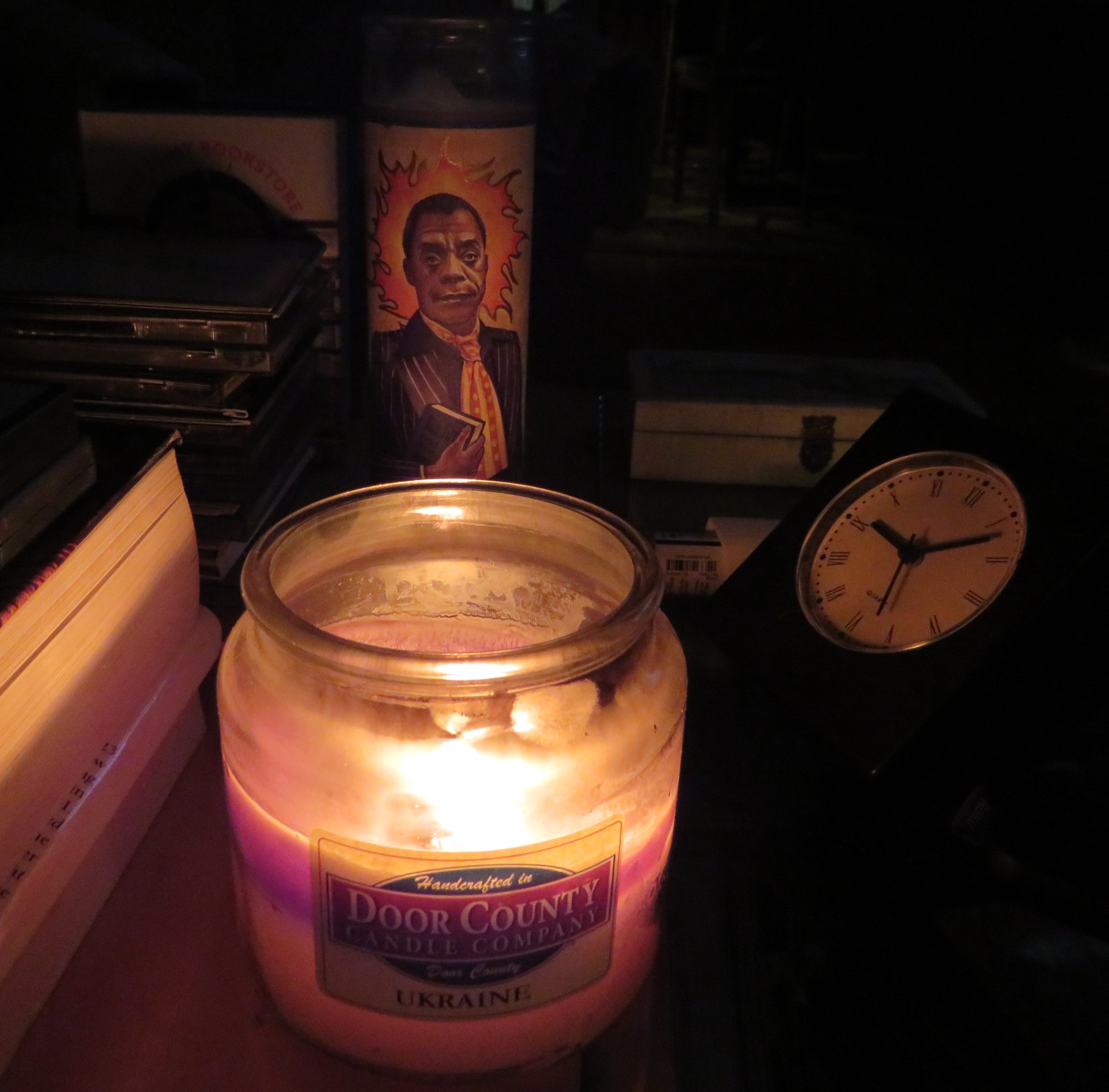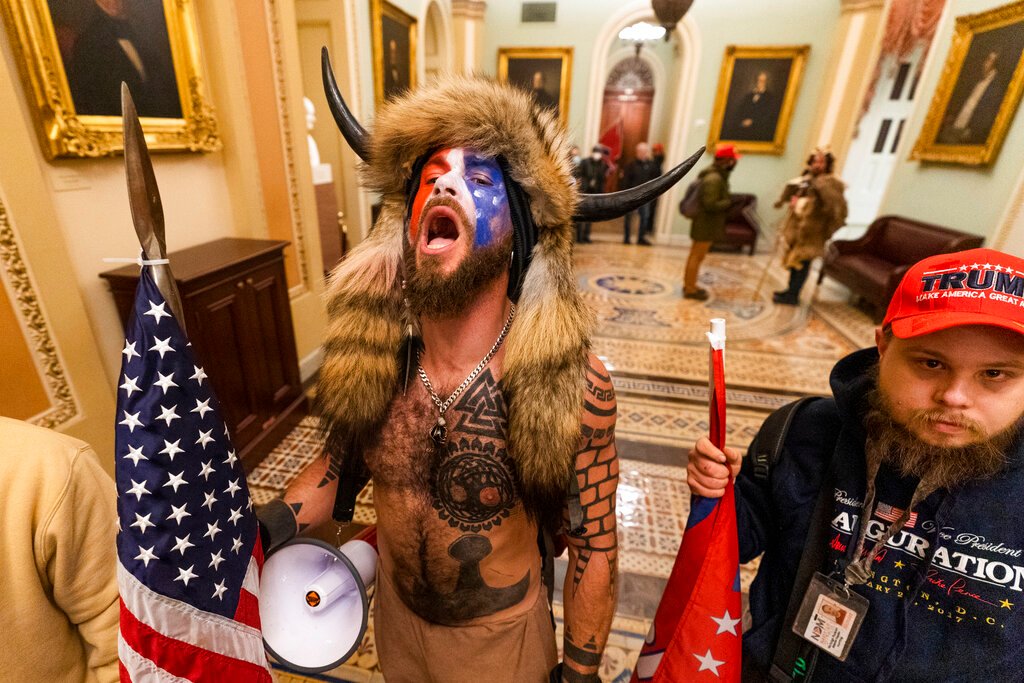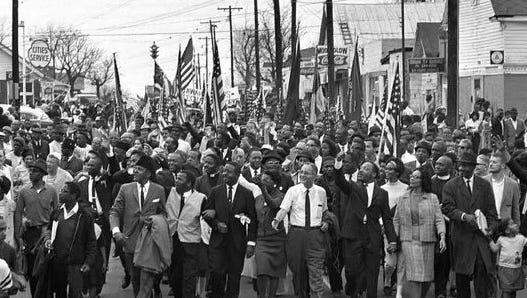
My well-used Ukraine candle from Door County Candle Co. Photo by Kevin Lynch
Ukraine Fire (in the Rag and Bone Shop of the Heart)
In this moment something calls,
So, I listen, mute receptacle, past the painful loss of another younger sister,
realizing thousands of Ukrainians have lost how many family members.
I’ve been reading about war as contemplated in the marvelous anthology,
Rag and Bone Shop of the Heart: Poems for Men 1
So, the hell-on-earth of the Ukraine War rises acrid from my gut,
yet what have I suffered of horridly, brutally, inhumanely genocidal devastation?
I reflect, yes, we have more of the hoary old West versus East,
and the festering of poisoned power, delusion of hate-bile wallowing in past glory.
So, I sit glumly and light my Ukraine candle from Door County,
with its blue and yellow colors, summoned to fire
on days that seem apt to the moment and sentiment
of accumulating lost innocent lives, souls stripped from mangled bodies.
“Parents very old that had one son,” President Zelenskyy described a typical loss,
adding, Russians have abducted and “weaponized” tens of thousands of Ukrainian children.
Is this inflamed point in history imploring madly upon that fiery candle tip?
***
For perspective, America’s war of North and South never fades as a barometer
of bloody border tragedy at a local level, of fraternal countrymen dying
for a perversion of The Declaration’s ideals of liberty for all.
“Gettysburg – a town of only 250,000 inhabitants – was one makeshift burial ground, fetid and steaming” is how Garry Wills pointedly describes it.2
Somehow, Lincoln transcended and, yes, abstracted, the tragedy, but with rhetorical genius
embraced, emancipated, and let the healing begin, North and South, a horribly wounded nation.
“Lincoln sensed, from his own developed artistry,
the demands that bring forth classic art –
compression, grasp of the essential, balance, ideality,
an awareness of the deepest polarities in the situation
(life in the city coming from the death of its citizens).” 3
Might someday, sooner than later, Ukraine hear its version of the Gettysburg address?
Until then, so much remains to mourn and yes, fight for.
We have witnessed from afar war crimes to begin rivalling Hitler and Stalin.
Each a mad Ahab in his time, even somebody’s hero! 4
(“The blackness of darkness,” Melville called it, he the writer who, upon meeting — at a dinner of unfathomable spiritual trembling — Hawthorne, our great chronicler of dark American Puritan spirit. Melville, himself from stern Calvinist stock, then transformed his drifting whale yarn into a looming, cascading, doomed nation-ship, bursting at its blackest seams
amid the ocean’s rhythms, engulfing all, to roll,
“as it rolled five thousand years ago…”
into the great American novel,
having swallowed and subsumed
the rainbow-hued crew, Ahab’s blood and the harpoon-pierced White Whale’s,
two bloods perhaps commingling in dark destiny.)
So, now a wider question, “What Can We Hope For?”
Yes, another voice rises from the grave,
or in the wind of ashes aloft in air,
circling into small silos of sound,
the song whispering, now sonorous
of the speaker (who asked thusly),
Richard Rorty, Richard Rorty…
the name itself rings in alliterative echoes,
like an old folk hero.
He, recently deceased American pragmatic philosopher,
posthumously urges us past philosophy and ideology,
to effective action,
to something to reasonably hope for, as a whole nation. 5
Could this Ukraine tragedy, as Wills says happened in the Civil War,
bring an emergent form of victory –
blood welling ‘round new roots,
rising rose-red with thorny shoots,
new blood from shed blood,
spirit anew in the proud, billowing, blood-streaked blue and yellow banner –
of this European democracy,
when it wins, finally wins, its sovereignty, again?
How sure is the West, to assist in agonizing fits, what might’ve been won and spared by now?
Beyond the Civil War, America’s politics provide further dragging baggage,
a sordid history of Empire building, often tragically partial, in the name of “democracy.”
And even today, in America, remain those who perversely idolize Putin,
And his demagogic types, with strong-manly ways,
which Richard Rorty once warned us of. 5.
Whither American Christianity which heeds Jesus?
Can a Godless, sociopathic man be “our savior”? 6
Perhaps the Ukraine candle evokes my Catholic upbringing,
the flaming sentinel of vigil, of faith in righteousness holy spirit.
So, the spirit takes the deepest of inhalations and sighs
like a great buffalo of the plains,
yet don’t let the candle go out!
It shudders from the hot-breath wind.
Flame rises again, its small, defiant fire.
Hard to believe but, hear this:
This Door County Candle Company has delivered
one million dollars of direct aid to Ukraine
from its army of blue-and-yellow sixteen-ounce candles!
If that is not one — bigger than who’d imagine –
answer to Richard Rorty’s plaintive question,
I don’t know what is!
Soon I’ll buy and light another candle.
The spirit flickers again,
Light amid the Blackness of this Darkness, spreading around the globe,
as surely as changing climes, enshrouding Mother Earth.
Can we ever feel their unfathomable pain?
That which is the world’s is Ukraine, Ukraine!
— Kevin Lynch, September 20, 2023
____________
Here is the link to the Door County Candle Company’s Ukraine candle. All proceeds go to Ukraine: https://doorcountycandle.com/products/ukraine-16oz-candle
- Robert Bly, James Hilman, Michael Neade, ed., Rag and Bone Shop of the Heart: Poems for Men, Harper Collins, 1992
- Garry Wills, Lincoln at Gettysburg: The Words that Remade America, Simon and Schuster, 1992, 21
- Garry Wills, Lincoln at Gettysburg, 52
- For a book-length discourse on the relation between Moby-Dick and totalitarianism, see C.L.R. James, Mariners, Renegades & Castaways: Herman Melville and the World We Live In, Dartmouth, 1978
- Richard Rorty, What Can We Hope for? Essays on Politics, Princeton, 2022
- From whence come the political rationalizations of Christian Evangelicals, “speaking with God?” “(The mind is its own place, the mind has a mind of its own) This is a domain that, without ever having to name it, the right has always best known how to manipulate.” Jacqueline Rose, in “The Analyst,” a review of Jamaican-British writer/activist Stuart Hall’s memoir Familiar Stranger, The New York Review of Books, Sept. 21, 2023, 50.



